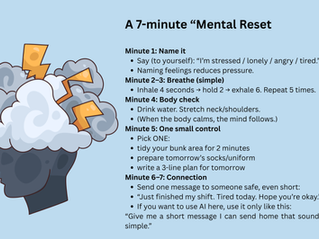Working Together Across Generations Onboard
- IMEQ CENTER

- Aug 29, 2025
- 3 min read
Life at sea brings together people from all walks of life—different countries, cultures, and ages—all working side by side to keep the vessel running. On any given ship, you might have a young cadet experiencing their very first voyage, a seasoned officer with a decade of contracts behind them, and a captain who has been sailing since before GPS navigation became the norm. Each person carries their own strengths, shaped by the time they’ve spent in the industry and the tools they’ve used along the way.

These differences can sometimes lead to misunderstandings. Work habits, communication styles, and ways of solving problems may not always match between younger and older crew members. But when approached with respect and curiosity, these differences become a huge advantage—blending fresh energy with steady experience to create a stronger, more resilient team.
Why Generations See Things Differently
It’s not really about “old” versus “young”—it’s about the experiences that shaped each person’s approach to work.
Younger crew tend to be quick with technology, eager to learn, and open to trying new ways of doing things.
Older crew often have steady judgment, deep technical knowledge, and a wealth of lessons learned from years at sea.
Middle-generation crew usually balance both worlds—bringing enough experience to lead while staying open to change.
When these perspectives blend, a ship can run more efficiently, with better teamwork and fewer conflicts.
Onboard: Building Respect and Understanding
1. Listen Before Reacting
If someone does a task differently than you would, ask why before making assumptions. You might discover a safer method or a useful shortcut.
2. Swap Skills
Encourage informal “training moments” between generations:
Younger crew can help with digital reporting, apps, and new ship systems.
Older crew can pass on seamanship skills, engine room know-how, and crisis handling.
3. Avoid Stereotypes
Not every older seafarer avoids technology, and not every younger one lacks discipline. Treat each crew member as an individual.
4. Make Time for Connection
Friendship builds trust. Share a coffee, play cards, or join a crew activity after your shift. People work better with those they know well.
5. Keep Communication Clear
Some crew may not be familiar with newer technical terms, while others may not understand older nautical slang. Use plain language that works for everyone.
Ashore: Strengthening the Team Between Voyages
1. Debrief Together
After a contract ends, gather the whole team to share what worked well and what could improve. Hearing multiple perspectives builds mutual respect.
2. Train as Mixed Groups
When training, mix different age groups. Younger crew gain experience from their seniors, while older crew learn about new technology and procedures.
3. Celebrate Combined Wins
Highlight moments where teamwork between generations made the difference—such as repairing equipment faster because of a combined approach.
Tips for Each Generation
For Younger Crew
Be open to learning from those with decades of experience—they’ve solved problems you haven’t faced yet.
Show patience when older colleagues take longer to adapt to new systems.
Ask questions—it shows respect and helps you grow.
For Older Crew
Stay curious about new tools and methods—they might make your work easier.
Avoid dismissing younger ideas too quickly—innovation often comes from fresh perspectives.
Share your knowledge in a patient, step-by-step way.
For Middle-Generation Crew
Act as the bridge—translate between traditional methods and modern tools.
Encourage teamwork instead of competition between age groups.
Support training that involves both learning and teaching.
If Tensions Arise
Small misunderstandings can grow if left alone. Address issues early, in private, and focus on the task, not the person. Ask about the reason behind someone’s approach—it often clears up the conflict immediately.
Final Thought
Different generations bring different strengths. Younger crew bring energy, tech skills, and fresh ideas. Older crew bring wisdom, calm under pressure, and deep know-how. Middle-generation crew often balance the two. When these strengths are used together, you don’t just have a crew—you have a team that can handle whatever the sea delivers.





































































































I was diagnosed with Parkinson’s disease four years ago. For over two years, I relied on Levodopa and several other medications, but unfortunately, the symptoms kept getting worse. The tremors became more noticeable, and my balance and mobility started to decline quickly. Last year, out of desperation and hope, I decided to try a herbal treatment program from NaturePath Herbal Clinic.Honestly, I was skeptical at first, but within a few months of starting the treatment, I began to notice real changes. My movements became smoother, the tremors subsided, and I felt steadier on my feet. Incredibly, I also regained much of my energy and confidence. It’s been a life-changing experience I feel more like myself again, better than I’ve felt…